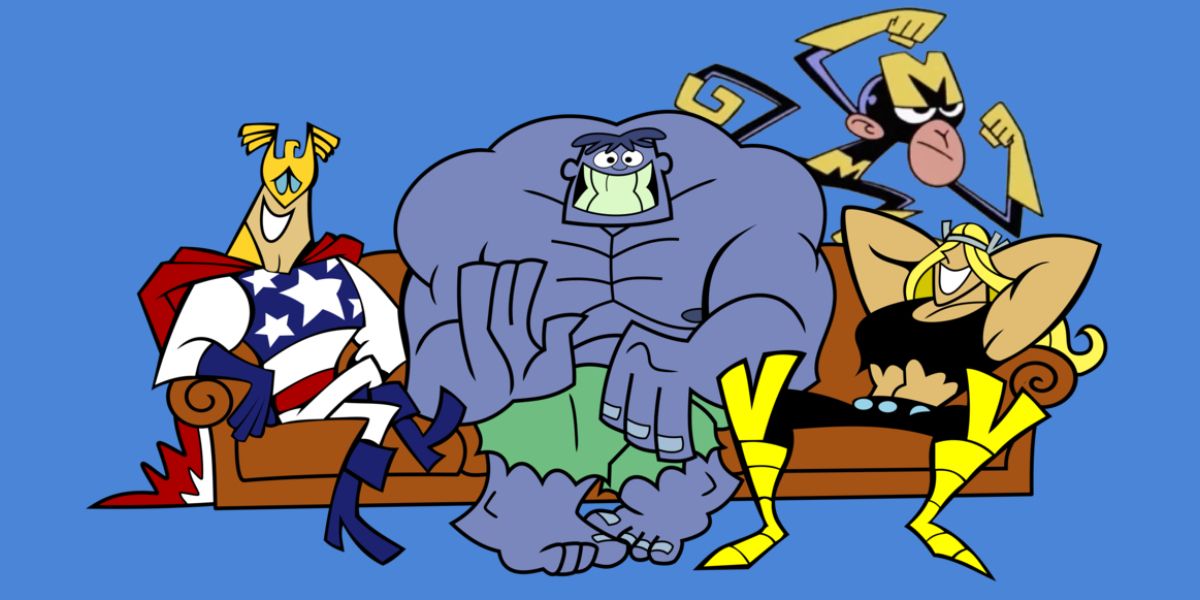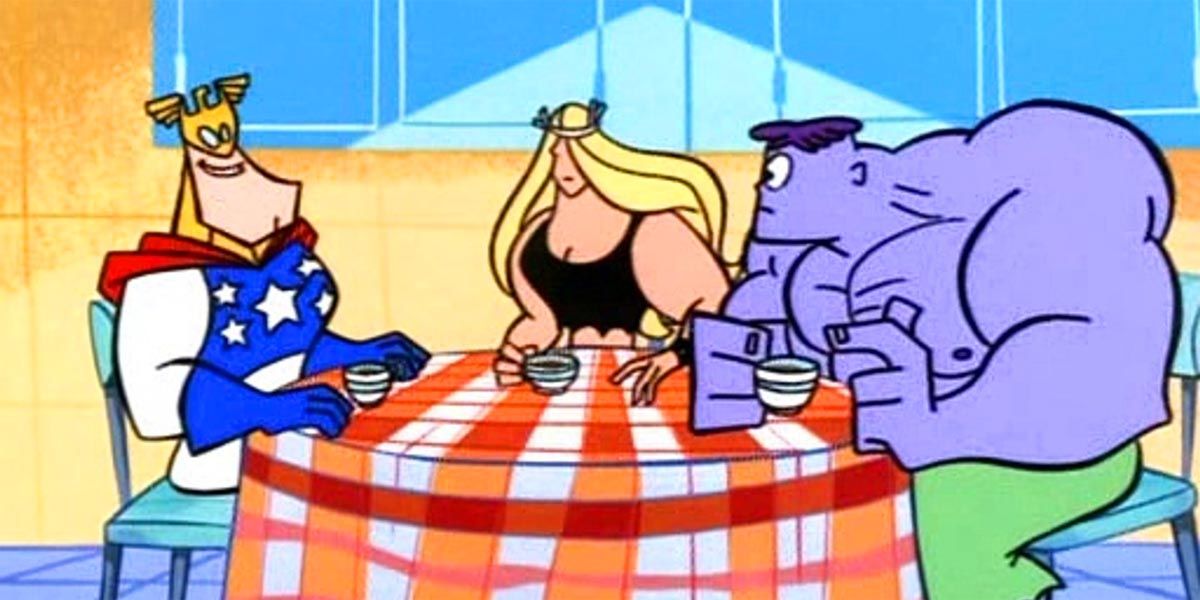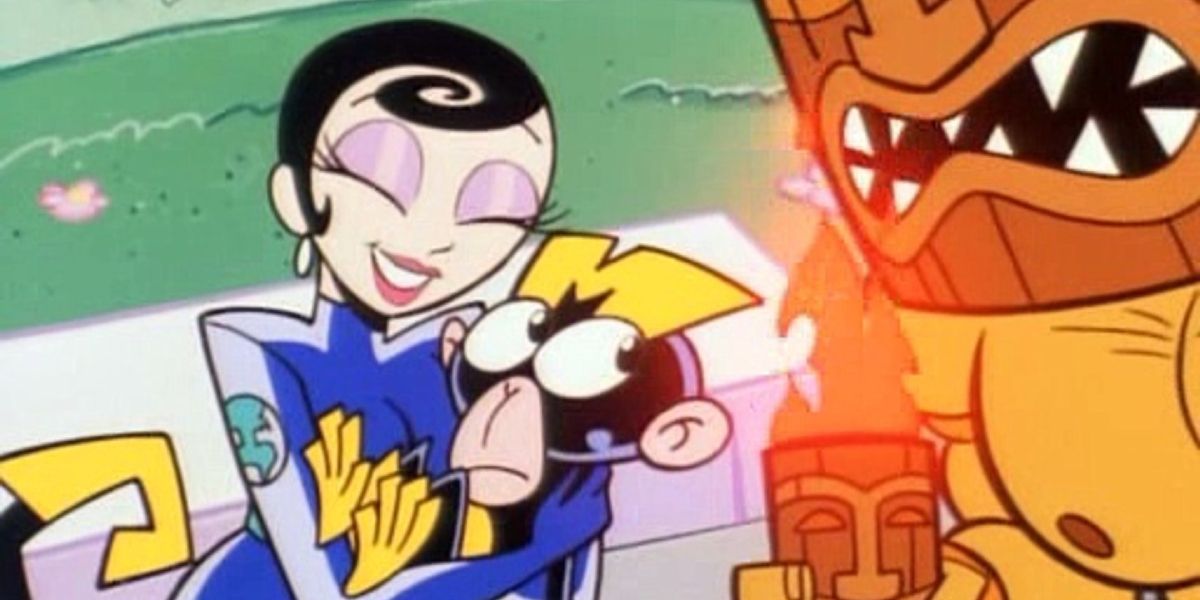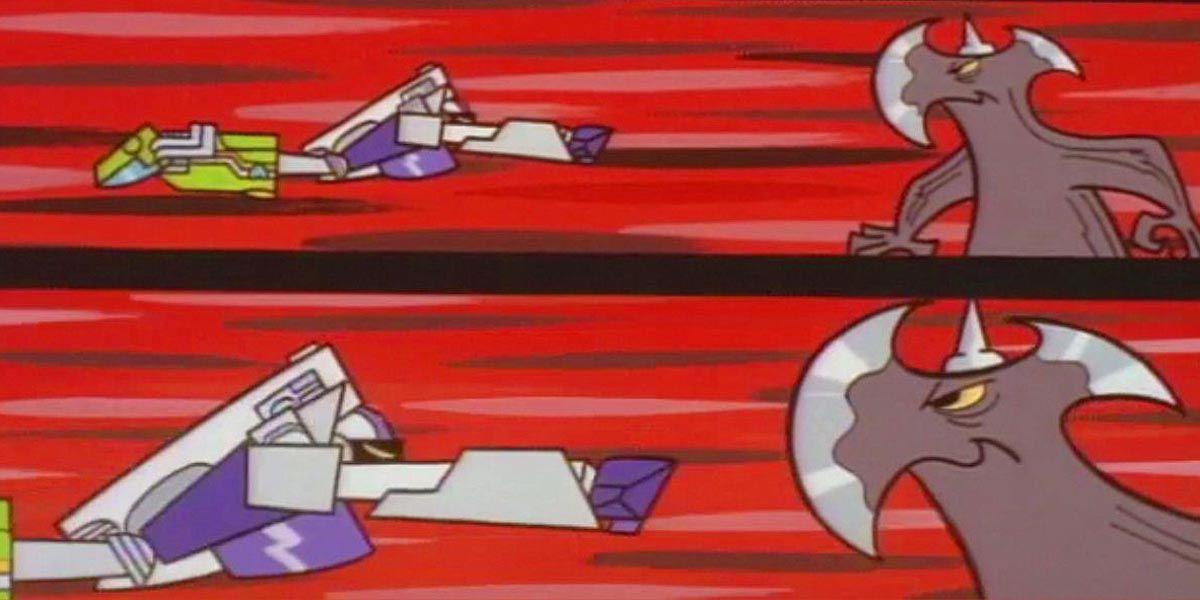If you were watching Cartoon Network in the late 1990s to the early 2000s, you're likely very familiar with Dexter's Laboratory. Created by animation industry iconic Genndy Tartakovsky, the show followed Dexter -- a boy-genius with a secret laboratory who frequently had to contend with his inventions going horribly awry, his nosy older sister Dee Dee or the various villains who seek to cause harm. However, in between the science-themed hijinks, Dexter's Lab also featured two of the best superhero parodies in modern pop culture.
During its original two seasons (though primarily during Season 1), Dexter's Lab aired two mini-shows in-between its regular episode segments: The Justice Friends and Dial M for Monkey. Both were lighthearted spoofs of comic book heroes. And although they each took a slightly different approach to this idea, both also achieved fantastic results.
The Justice Friends largely served as a parody of Marvel Comics' Avengers. The show starred the trio of Major Glory, Valhallen and the Infraggable Krunk -- analogs for Captain America, Thor and the Incredible Hulk, respectively. Rather than epic superheroics, however, many of the Justice Friends' adventures centered around the mundane situations and arguments that often take place between roommates. Sure, they could be seen battling a supervillain every so often, but they could just as often be found dealing with things like Krunk's toothache or Major Glory's apparent allergy to fellow superhero White Tiger.
Taking exceptionally powerful superheroes and having them struggle with everyday tasks is pretty hilarious in and of itself. However, Justice Friends took things even further with how it satirized superhero tropes. In addition to being an obvious parody of Captain America, Major Glory also took inspiration from DC Comics' Superman -- with the writers often poking fun at those characters' over-the-top patriotism and relentless optimism. Major Glory is a virtue of justice who is beloved by the press, but -- in his private life -- is an utter neat freak whose need for perfection borders on obsessive, much to the chagrin of his roommates. Speaking of, Valhallen and Krunk are great spoofs of Marvel heroes in their own right -- Valhallen essentially being a cross between the God of Thunder and Eddie Van Halen, while Krunk is a child-like version of Bruce Banner's Hulk who watches the TV Puppet Pals religiously.
The other major superhero parody segment that aired as part of Dexter's Lab was Dial M for Monkey. The show revolved around Dexter's pet monkey, named Monkey. Little does Dexter know, the seemingly normal primate actually moonlights as a superhero, also named Monkey (just go with it).
An obvious play on DC's Dial H for Hero (itself a reference to Alfred Hitchcock's Dial M for Murder), Dial M for Monkey follows the exploits of the animal superhero and his human partner Agent Honeydew, who is able to communicate with him telepathically. Both working at the behest of Global Security (apparently based on Marvel's S.H.I.E.L.D.), Monkey and Agent Honeydew are often tasked with saving the world from various threats and enjoying each other's company during their downtime.
It sounds absolutely absurd, doesn't it? But that's precisely what makes it work, as this surrealist style of humor works in tandem with the fact that -- in contrast to The Justice Friends -- Dial M for Monkey actually takes it superheroics seriously for the most part. The threats Monkey must contend with are presented as genuine and dire, and the series has some genuinely interesting hero/villain dynamics -- like that between Monkey and Simion. At the end of the day, however, it's still a monkey in a black spandex superhero suit saving the day with his human companion (and possible love interest). In-universe, the characters just know and accept all of this as normal. The viewers, however, are able to get a kick out of just how unabashedly bizarre it all is.
So, we know what makes The Justice Friends and Dial M for Monkey what they are, and how they each approach parodying well-known superheroes. But what exactly makes these parodies so good? What exactly makes them the gold standard for on-screen comic book spoofs? Well, it all comes down to one thing: affection for the source material.
The best parodies come from people who genuinely love, or at least respect what it is they're spoofing, and want to pay homage as much as they want to poke fun (just look at "Weird Al" Yankovic). It only stands to reason that The Justice Friends and Dial M for Monkey would be great parodies, as the Moscow-born Tartakovsky has a deep affection for superheroes -- having read numerous Marvel comic books as a kid to help him learn English. What's more, that affection clearly hasn't left, with Tartakovsky writing and illustrated the Luke Cage-starred comic book Cage! for Marvel Comics back in 2017.
This deep connection to the source material clearly played a part in making The Justice Friends and Dial M for Monkey excellent spoofs that lampoon superheroes and their tropes, yes, but also honor comic books and their contributions to modern pop culture. Moreover, they were intended for kids and adults alike, combining slapstick humor and absurd situations kids will love with genuinely clever sociopolitical or otherwise off-color jokes only an older audience will fully appreciate. The shows were also very well-orchestrated, containing their own narratives while also existing in a shared Dexter's Lab universe. In fact, one of the franchise's best nods to comics is the crossover episode "Star Spangled Sidekicks," the title card for which is a direct homage to Alex Ross' cover art from DC's Kingdom Come. Compare that to, say, 2008's Superhero Movie -- the parodies in which were poorly thought out and far from good-natured.
Fair enough, Superhero Movie is probably the most watchable of those abysmal "parody" films we got back in the 2000s. There's something strangely nostalgic about Drake Bell playing a crude analog for Tobey Maguire's Spider-Man. Even so, it represents why many critics consider the glory days of parody to be behind us. There's no real nuance or affection present; it only really exists only to be mean-spirited.
Once upon a time, there were phenomenal good-natured parodies like Spaceballs, which lovingly parodied the original Star Wars trilogy, as well as numerous other sci-fi films. However, films like that eventually gave way to the likes of Meet the Spartans or Disaster Movie, which are even more egregious in their unfunny, mean-spirited spoofs than Superhero Movie. The Justice Friends and Dial M for Monkey are prime examples of the former camp -- parody done right.
That's not to say Dexter's Lab's superhero parodies are only good because they're on the older side (especially since some of the humor is definitely dated). In fact, they've seen some genuine competition in recent years. DC, for instance, has become something of a master at self-parody through things like The Lego Batman Movie and Teen Titans Go!. In fact, given its genuinely hilarious in-jokes, Teen Titans Go! would probably be the new gold standard for superhero parody if it could just learn to leave the tiresome toilet humor behind.
For now, however, The Justice Friends and Dial M for Monkey stand as a testament to how funny, effective and just outright enjoyable comic book spoofs can be when crafted by those who want to laugh with their favorite heroes, not at them.




